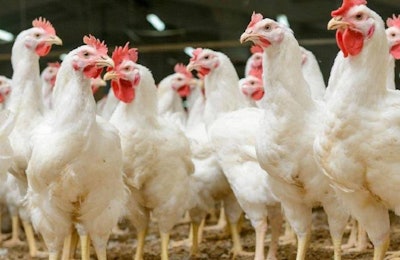
The recent winter storms have had a significant negative impact on Sanderson Farms’ operations in Texas, Louisiana and Mississippi. As a result, the chairman and CEO of Sanderson Farms said the company will process about 1.6 million fewer chickens at its plants in those three states.
Sanderson Farms initially reported some losses due to winter storms Uri and Viola in a press release issued on February 16. Through another press release and speaking during the first quarter conference call on February 25, Chairman and CEO Joe F. Sanderson Jr. offered an update on the situation.
“Because of the record low temperatures, power failures, snow and Ice, and hazardous road conditions, we were unable to operate our processing plants, deliver day-old baby chicks to broiler farms on our regular schedule, pick up hatching eggs from breeder farms and set those eggs in our hatcheries, or manufacture and deliver chicken feed to the farms of our contract poultry producers,” said Sanderson.
While operations were disrupted at Sanderson’s poultry plants in those states after the storms hit, operations were able to resume on February 22 at all of those plants except for the one in Hazlehurst, Mississippi, which returned to normal operations one day later.
Sanderson said he was grateful that none of the poultry plants were damaged and all employees appeared to remain safe. However, the company’s live production supply chain “experienced interruptions and losses similar to a hurricane,” Sanderson said.
The company lost 455,000 broilers in houses that lost power, water or feed, or had roofs collapse under the weight of the snow and ice. The company was also forced to humanely euthanize about 545,000 chicks at its hatcheries in Texas, and was unable to pick up and set 703,000 hatching eggs at those hatcheries.
“We deeply regret the losses incurred due to extraordinary circumstances beyond our control, or our independent contract poultry producers’ control,” he said.
Because of those losses, Sanderson said over the next 10 weeks, the company will process about 1.6 million fewer chickens at the plants in the three affected states. He estimated that those losses would represent a little less than 1% of the head they expected to process during the second quarter, which will conclude at the end of April.
Sanderson Farms is communicating with insurance providers to quantify its losses.
Despite the unfortunate outcome of the storms, Sanderson gives credit to many to help the company keep its losses to a minimum.
“Our employees, managers, contractors and contract poultry producers in Texas, Louisiana and Mississippi have navigated a historic weather even over the past two weeks. They have shown sheer determination, and we are extremely grateful and proud for their efforts,” he said.
He also expressed his appreciation for public utilities, fuel suppliers and local emergency management officials who helped them through the situation.
Financial results
While on the call, Sanderson Farms executives discussed the company’s financial results for the first quarter of fiscal year 2021. The quarter ended on January 31.
Net sales for the first quarter of fiscal 2021 were $909.3 million compared with $823.1 million for the same period a year ago. The company reported net income of $9.5 million, or $0.42 per share, for the quarter compared with a net loss of $38.6 million, or $1.76 per share, for the first quarter of fiscal 2020.


















